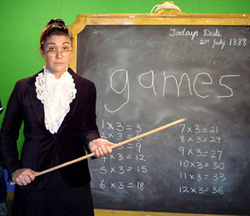
Quote: "In the new information economy, expertise is less about having a stockpile of information or facts at one's disposal and increasingly about knowing how to find and evaluate information on a given topic." (p. 93)
I chose this quote because it explains one of the ideas that has resonated the most with me throughout this whole semester. I want my students to know how to solve any problem that they come across; not right away by regurgitating facts and theorems that I have taught them, but instead by using their critical thinking skills and resources. In whatever career they have they will have access to technology to help them solve problems. While being about to recite the first 20 digits of Pi from memory is a real crowd pleaser at a party, if they ever need that information at their job they will be able to look it up online.
Question: How do I prepare my students to use technology that hasn't even been invented yet?
Connection: This class connects to the quote above because we have been exploring different research tools all semester. Based off of the things we have done I feel confident that I could find any type of app or technology curriculum that I wante to use in my class, and be able to implement it effectively.
Epiphany: I had an epiphany about epiphanies while reading this chapter. I realized that an epiphany does not just have to be about finding an answer to a question, but can instead be making sense of how information fits together.
Chapter 8
Quote: "Geeking out asks the question: How can I utilize the available resources, both social and technological, for deep exploration?" (p. 105)
This quote again shows the importance of teaching students how to use technological resources and not just facts and procedures. Students use technology to socialize and to do research about topics that interest them outside of school. We now need to bring that type of learning into the classroom.
Question: How do you explain this type learning through exploration with technology to parents who did not learn this way in school?
Connection: In this class we have badges that are named after the three stages. We went from setting up our PLN in the first badge to creating our own digital curriculum in the last one. Showing our progression from being visitors of the internet to residents.
hmm: The process described above takes time. It takes a lot of effort and exploration to get to the geeking out stage. So I am concerned how to guide my students through these stages in just one year.
Chapter 9
Quote: "We look to gamers because they don't just embrace change, they demand it. Their world is in a constant state of flux, and it must be continually reinvented and reimagined through acts of collective imagination." (p. 115)
I agree with the authors that it is important for students to demand change like gamers do. We need to create a learning environment where students are constantly required to reinvent and reimagine. This quote also touches upon the importance of collaboration. The best way to learn to embrace, then demand, change is to work with others to achieve a common goal.
Question: This book discusses how students learn a great deal from playing online games so we should set up our classes like games. Students have many different learning styles. How do I differentiate this type of learning for students who don't like games?
Connection: This notion of playing to learn connects to this class through our 20% projects. We create something by doing that we enjoy that is interesting to us. Since we are interested in the topic we are more likely to research it further and therefore have more epiphanies than if the topic was something that we were assigned.
Ah-ha: The authors discuss how we must value play more than answers and outcomes in order to create a learning environment where students learn through exploration and imagination.
 RSS Feed
RSS Feed
